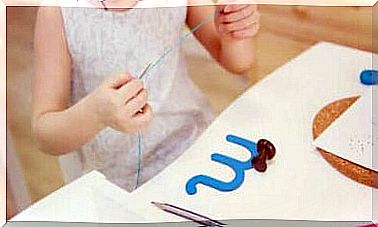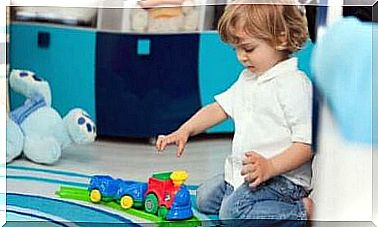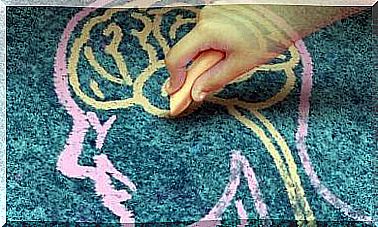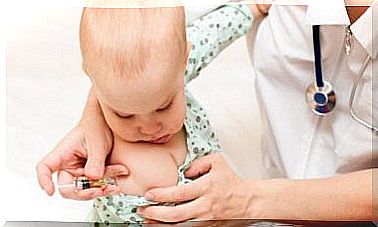What Causes Scales On The Newborn’s Skin?

A newborn’s skin is extremely fragile and will continue to change its appearance during the first few weeks of life. This can include a small amount of scales that shouldn’t alarm the parents, as this is normal. If you’re wondering what causes scales on your newborn’s skin, then don’t miss this article.
Certainly, the appearance of scales on the newborn’s skin can occur anywhere on the body, although it happens mainly on the hands, soles of the feet and ankles. This is because all babies lose the outer layer of skin within the first two to three weeks after birth.
Also, the amount of scales on the skin can vary. It often depends on whether the delivery was premature, term or delayed. In other cases, scales may appear as a result of conditions that require treatment.
However, some degree of dryness after birth is completely normal and usually goes away on its own. In general, this does not require any special care on your part.
Causes of scales on newborn skin
If your baby’s skin appears to be dry or begins to peel in the weeks after birth, knowing the causes may alleviate your concerns. So, let’s tell you what the causes might be:
1. Ichthyosis
First, scaling and dryness can be caused by a genetic condition called ichthyosis. This skin condition causes flaking, itching and detachment of the skin.
Your doctor can diagnose your baby as having this condition based on your family’s medical history and after performing a physical examination. During this test, your doctor may also take a blood or skin sample.
There is no cure for ichthyosis, but applying creams regularly will relieve dryness and improve your baby’s skin condition.
2. Eczema
In some cases, flaking and dry skin are caused by a skin condition called eczema or atopic dermatitis. Eczema can cause dry, red, itchy patches on your baby’s skin.
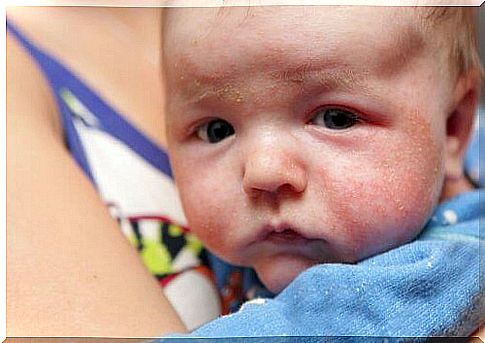
This condition usually does not appear immediately in the period after birth, but it can develop later in childhood. Its exact cause is unknown, but several factors are thought to trigger an outbreak, including exposure to irritating substances such as shampoos and laundry detergent.
Tips for reducing scales on newborn skin
If the child appears to be uncomfortable due to the peeling of the skin, the most important thing is to alleviate the discomfort. In addition to this care, the love and special attention of parents will help the most.
These are some tips that will allow you to reduce the scales on your child’s skin:
1. Bathe with warm water
Hot water dries out the skin of people of all ages, including newborns. If your baby has scales on the skin, you should not use very hot water. Baths with warm water are ideal for a newborn’s sensitive skin, always complying with special recommendations for the hygiene of these babies.
2. Use baby shampoo
To help treat and prevent skin peeling, wash the newborn only with a shampoo specially formulated for babies. The soap you use is likely to be too harsh for your delicate skin.
3. Use a humidifier
Using a humidifier at home can make a difference in your baby’s skin care. Humidifiers add moisture to the air, which helps treat and prevent skin peeling.
Doing this is very simple: put the humidifier in the room where your baby spends the most time and let it run for a few hours whenever the air feels a little dry.
4. Limit time in the bathtub
Bathing can have an adverse effect on your baby’s skin. Prolonged periods in the bath water can eliminate natural oils and make your baby more susceptible to scaling. So cut down on your bath time and you’ll quickly be able to see the difference in your baby’s skin.
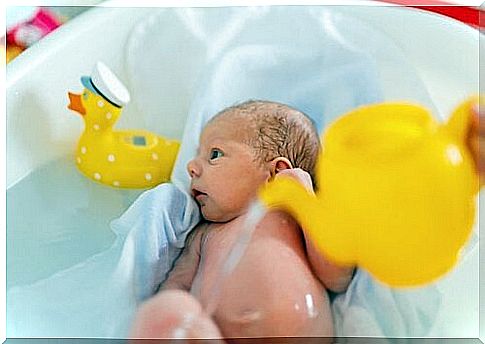
5. Hydrate the baby often
Maintaining constant levels of water in the body is absolutely necessary. The established routine for breastfeeding or formula-based bottle-feeding must be strictly followed, and omissions must be avoided. Feeding and hydration help rebuild skin moisture.
Finally, remember that the appearance of scales on your newborn’s skin is normal, and you don’t need to worry too much. Anyway, with this list of possible causes and the tips exposed here, you can know the origin of its appearance and how to treat them.
